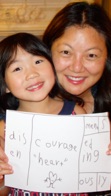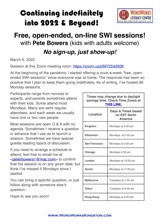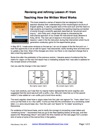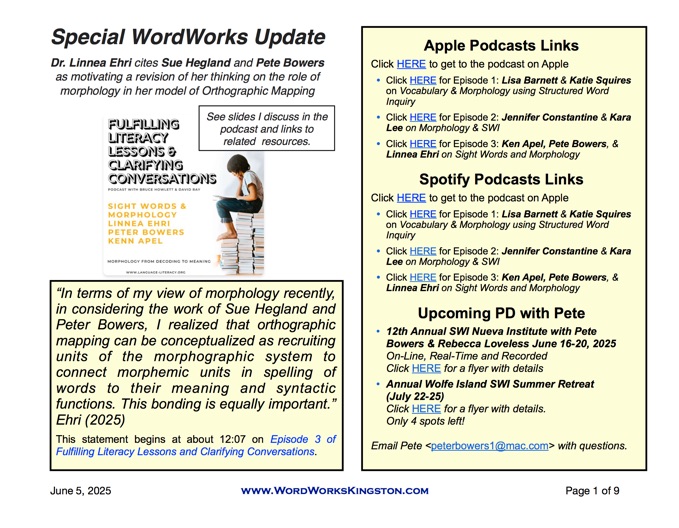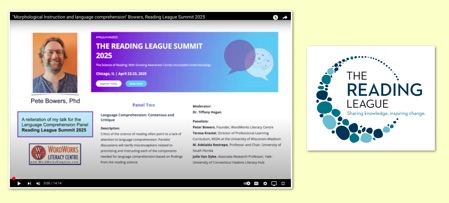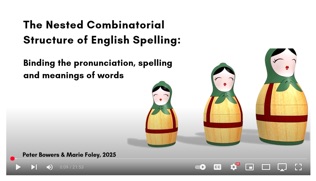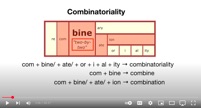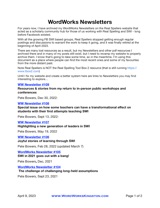
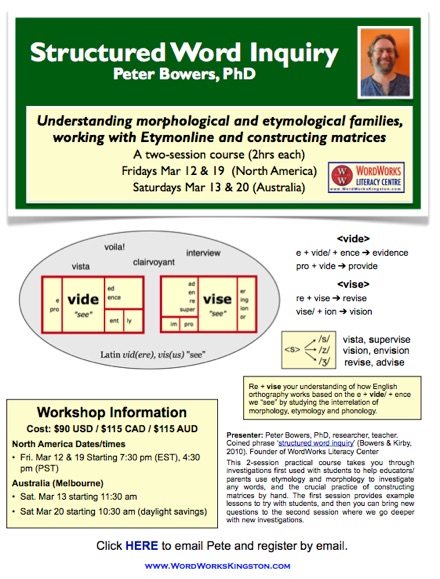
(Scientific Word Investigation)
“Word Scientists” look for the deepest word structures that make sense of the greatest number of words.
Click HERE for background on SWI.
See an introduction to WordWorks and Structured Word Inquiry
(including videos) here
WordWorks Literacy Centre
Spelling it like it is!
Nothing motivates like understanding
Free SWI Digital Drop In Sessions Monday’s 5pm EST
I began offering this free weekly session at the beginning of the COVID pandemic in an effort to ensure teachers and parents had a place to pose questions about SWI whether or not they could afford to attend more formal on-line courses.
The response has been so rewarding (and fun) that I’ve only missed a handful Mondays since the first session on March 23rd, 2020. I plan to continue indefinitely even once we are past the pandemic.
There is no sign up, just a regular date and time to join. Most weeks we simply address questions people bring. Some weeks we have a special guest, or planned investigation to share. Every week has novices and experts who come to share their questions/experience, or just listen in.
Click THIIS LINK for a document reflecting on learning from the first session that is filled with links to free resources to build understanding of scientific word investigation.
Revised <sign> Lesson in “Teaching How the Written Word Works”
Books printed after May 2013 already include the revised lesson. You know you have the revised version if you see on <ify> suffix on the <sign> lesson on page 8. Even if you have the revised version, I recommend you download this pdf to gain from the explanation that helped me understand why this revision was needed.
Structured Word Inquiry at
The Nueva School
Click HERE to see the page on the Nueva School website describing how Structured Word Inquiry has transformed the instruction at this top US private school. It includes a video illustrating how this work is integrated across the grades.
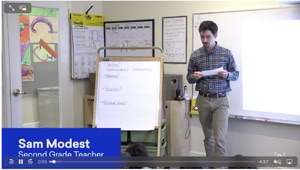


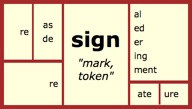





Explore Lyn Anderson’s excellent blog with illustrations and resources about structured word inquiry for all ages at this link .
Lyn has been developing her understanding and practice in this area for over a decade. Her lessons and ideas for morphological instruction from the start are just exceptional.
-
 Beneath the Surface of Words (Sue Hegland)
Beneath the Surface of Words (Sue Hegland) -
 Backpocket Words (Gail Venable)
Backpocket Words (Gail Venable)
<s> → /s/
E.g., sign, signal, assign
<s> → /z/
E.g., design, resign,
does, goes
-
 Related Websites
Related Websites -
(Lyn Anderson, AUS)
-
✦Structured Word Inquiry: An implementation guide for teachers
-
✦LEX (Gina Cooke)
-
✦Literacy Dr. (Jennifer Petrich)
-
✦Word Torque (Fiona Hamilton, Bangkok)
-
✦Learning About Spelling (Sue Hegland)
Key Links
-
 On-Line Resources Supporting Structured Word Inquiry
On-Line Resources Supporting Structured Word Inquiry -
✦Latdict (Investigate twin bases!)
-
 Classroom Blogs
Classroom Blogs
Tools for making matrices
Free trial versions of matrix making software for morphological analysis available for download
Click here for a “User’s Guide” for working with this computer tool including links to tutorial films, complementary resources and links to related research.
Video introducing the new “Mini Matrix Maker”
Watch this video to see how teachers and students can easily create matrices from word sums on Mac or PC computers with Neil Ramsden’s “Mini Matrix Maker”.
Resources for Spelling-Out and Writing-Out Word Structure with Word Sums
-
Click here for information on spelling-out word sums including a free pdf guide for teachers who want to use this process for learning, instruction and assessment.
-
 Spelling-Out Word Structure: Targeting Central Concepts, Assessment & Instruction
Spelling-Out Word Structure: Targeting Central Concepts, Assessment & Instruction
See a new article and video addressing these ideas all building on a practical lesson growing from a Grade 1 student’s question, “Why is their an <h> in school? You don’t hear it.”
Click here for a video of an on-line Skype session addressing this topic with Grade 2 teachers and an article addressing how this topic links to the UbD.
Applying the Principle of Backwards Design from UbD to Structured Word Inquiry
enduring understandings of how the written word works.
"This article by Pete Bowers makes some interesting connections between UbD, Real Spelling and the development of critical thinking skills in students."
Bill and Ochan Powell - Education Across Frontiers
English base <sign> from Latin root signum
"mark, token, indication, symbol”
go + es → goes
go + ne → gone
go + ing → going
do + es → does
do + ne → done
do + ing → doing
sign + al → signal
re + sign → resign
de + sign + ate → designate
sign + ate/ + ure → signature
Marcia Henry on WordWorks:
Marcia Henry is past president of The International Dyslexia Association
and former director of the Center for Educational Research on Dyslexia at San Jose State University
Must See Links
(Recommended as a an introduction to the ‘big picture’ of SWI)
Click HERE for this 18 min video of my talk at this TEDx event organized by students at The Nueva School near San Francisco that has done such seminal work with SWI. This video provides a brief overview to the theory and practice.
Click here for a page with notes on the talk and links to further resources.


Click here for a video of Nueva pre-school teacher Carolee Fucigna as they create a morphological web on the base <rain>. See how straight froward it is to investigate morphological families with readers and non-readers.
Click here for a post from Rebecca Loveless on “Word Bag Excitement” that offers teachers a sense of this excellent activity for studying word families modeled on Lyn Anderson’s work. This is a great reference for jumping in. Rebecca’s site has many more posts to explore too.
Click here for Mary Beth Steven’s brilliant recent post “Outer Beauty Attracts, but Inner Beauty Captivates.” This is a wonderful way to compare studying real “word families” compared to words that simply rhyme. Explore her whole blog!
Click here for an inspiring post, “Comprehending Spelling” from Sue Hegland’s excellent blog, “Learning About Spelling”. This is a short, accessible and eloquent case for why we should do the obvious -- teach our written word works.
Click here for this video on how morphological and etymological families work. This video is a collaboration between myself and Marie Foley. The video goes into many details about this topic that is so important for anyone teaching from an SWI frame.
More WordWorks Resources
Dr. Linnea Ehri cites Sue Hegland and Pete Bowers as motivating a revision of her thinking on the role of morphology in her model of Orthographic Mapping.
Click HERE to download a pdf with links to an important new literacy podcast, “Fulfilling Literacy Lessons & Clarifying Conversations.”
This document is a companion for the conversation hosted by Bruce Howlett and David Ray for Episode 3 of their new podcast. To my great fortune, they invited me, along wiith Kenn Apel and Linnea Ehri to discuss “morphology and sight words.” The document provides a brief reflection on how the “combinatorial guard rails” of the matrix and word sum provide evidence for the systematic spelling-meaning links Ehri describes as meeting her criteria for the mapping process. (BTW both Bruce and Dave are attending this summer’s Wolfe Island Retreat.)
The bulk of the document are resources and links related to the discussion. I include graphics that I drew on in the conversation. While you can follow the discussion just with the audio, I do recommend the seriously curious make a point of studying those graphics while listening. I also share links to other videos and research that will help make sense of this discussion.
We will see what unfolds, but I can’t think of many ways that would bring more research attention to the role of the matrix and the word sum for understanding how spelling works. This was my motivation for starting my grad work in the first place. I wanted to bring sufficient attention to these tools that the research world would be motivated to study them empirically. Ng, Bowers and Bowers (2022) is the only study I know of that has tested the matrix against other presentations of written words. That is not being replicated with children by the Structured Word Inquiry Research Vanguard (SWIRV). Things are going in a healthy direction!
Video of Pete’s Talk at Reading League Summit 2025
-
Click HERE a version of my talk about morphological instruction and language comprehension for panel 2: Language Comprehension: Consensus and Critique.
WW Newsletter #115: Evidence of a healthy shift in the research
Click HERE for the first WW Newsletter of 2025.
Annual Wolfe Island SWI Summer Retreat (July 22-25)
-
Click HERE for a flyer with details. (Four spots let as of June 5th)!
-
Email Pete <peterbowers1@mac.com> to inquire/register.
-

-
•Click HERE for WordWorks fees and services
-
•Click HERE for descriptions of on-line courses
SWI and Pete in Literacy Podcasts & Blogosphere
-
•Shananan On Literacy points to Pete & Jeff Bowers re shift in thinking
-
Click HERE for the April 12 “Blast from the Past” post. In this post Tim Shanahan shares the post from 2017 in which he cited work from me and my brother Jeff. Even though we differed in our thinking about some key things, I was delighted at with his curiosity in our work, and took it as very constructive and positive exposure to it. However, Tim uses this ‘blast from the past’ to highlight to his substantial audience that given the research evidence since that point, he now is leaning more in the direction of our discussions back then and sees morphological instruction to be valuable earlier than he previously recommended. I so appreciate the modeling of following the science and publicly changing one’s thinking as a result.

-
•Interview on SWI on Anna Geiger’s Measured Mom ‘Triple R Teaching” Podcast
-
Click HERE to hear my discussion with Anna.
-
I was was particularly impressed with the clear research Anna did before our discussion. I received a lot of good feedback about this discussion, including from people who are often critical of SWI.
-
•Click HERE to rent my Hot Topic Webinar: SWI in the early years (PreK - Gr 2)
-
Other “Hot Topic” webinars hosted by Reading with TLC include sessions by figures including Maryanne Wolf, David Kilpatrick, Louisa Moats, and Jan Hasbrouck.
Videos on Research & Practice
See this VIDEO (Bowers, 2025) on the effect of morphological instruction for language comprehension at the Reading League Summit 2025
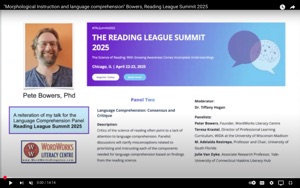
I decided to share this version of my recent talk. During the conference we were kept to a hard limit of 10 min. For this reiteration I have reinserted a few words and slides originally cut for time. This talk builds on ideas in the following two videos.
See this VIDEO (Bowers & Foley, 2025) on the ‘Nested Combinatorial Structure of English Orthography’ and how the matrix and word sum guide instruction fits that universal of oral and written language.
This video builds on David Share’s major new article “ Blueprint for a Universal Theory of Learning to Read: The Combinatorial Model. that is still in press, but accepted for publication by Reading Research Quarterly. The pre-print of that article is available HERE.
See this VIDEO ‘The Matrix Matters Because Language is Combinatorial’ (Bowers, 2025) was my presentation for the 9th Annual Dyslexia Virtual Conference of the Dyslexic Training Institute
This is the video I described as the ‘companion’ video I was working on in the video introducing this concept of language “combinatoriality” linked above.
This was my talk for the 9th Annual Dyslexia Virtual Conference which has just been made publicly available. This goes into much more detail on this important topic.
Videos about “Spelling-Out Orthography”
Click HERE for a video in which Shawna Pope-Jefferson interviews me on “Spelling-Out Orthography.”
This is an in-depth talk that includes discussing videos of young students using this process. To jump directly to that part of the video, click HERE.
See my webpage with many resources and videos on this topic HERE.
Click HERE for one of the videos you can find on that page with students and teachers using this practice of “spelling-out” for reading, spelling, and vocabulary learning.
Explore my archive of WordWorks Newsletters
and Special Publications at THIS LINK.
Click HERE for a story about frustrated 9-year old dyslexic who finally gets traction with English spelling when his tutor changes gears to great effect an they go on the hunt for suffixes.
Click HERE for a story about A 7-year old dyslexic and his tutor new to SWI are determined to make sense of English spelling
Click HERE for my most recent special publication of a teacher new to SWI having great success with her pull-out group.
Email Pete <peterbowers1@mac.com> to be added my WordWorks Newsletter mailing list.

Contact: Peter Bowers PO Box 295 Wolfe Island, ON, Canada K0H 2Y0
Phone: (613) 385-2084
Email: peterbowers1@mac.com
